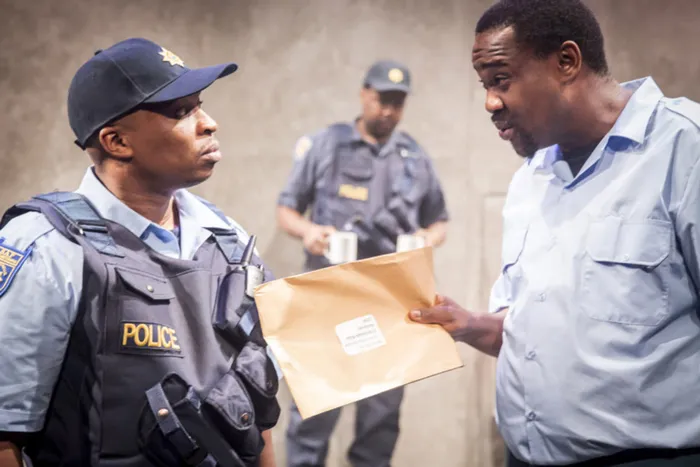
I SEE YOU by Mongiwekhaya, , playwright - Mongiwekhaya, Director - Noma Dumezweni, The Royal Court Theatre, 2016, Credit: Johan Persson/ I SEE YOU by Mongiwekhaya, , playwright - Mongiwekhaya, Director - Noma Dumezweni, The Royal Court Theatre, 2016, Credit: Johan Persson/
Tracey Saunders
IN the early days of democracy South Africa celebrated. A ceasefire was called and the supposed “Rainbow Nation” was birthed. Twenty two years later the celebrations are long over, hostilities have resumed and the rainbow has dissolved. For one very brief moment at the beginning of I See You, the cast are that misbegotten rainbow nation, literally as they dance in a perfectly synchronised, deftly choreographed Simunye sequence, replete with flashing lights. It is short lived and it’s not long before we are faced with the reality of today’s SA. A place where apartheid and it’s legacy throw a very, very long shadow.
We are introduced to Buthelezi in a poignant personal ritual as he smears himself with Vaseline. On a silent stage he prepares for battle, and it would seem that his daily struggle is against his colleagues, his family and the world in general as much as it is with himself. The simple act of watching him self-anoint as he dresses is one of many moments in the play where small gestures speaks volumes. Dube as Buthelezi is a contradiction of a man, proud and fearful, resentful and righteous and seemingly destined to despair. Dube plays the policeman with an insouciance that he doesn’t bother to conceal. Whether personal or professional, his bitterness seeps in to everything that he does and he seems symptomatic of a police force that is decaying from the inside. It is Major Shabangu (Lunga Radebe), soon to be station commander that represents the political aspirations of the men in blue and in one short interchange Mongiwekhaya provides a precise and chilling analysis of the police force post Marikana. Police corruption, nepotism and state sanctioned brutality are all masterly woven in to the script in small phrases with far-reaching consequences.
The aptly named Skin (Jordan Baker) first meets Ben (Bayo Gbadamos), in a nightclub. Earlier the portentous tones of Mpumi’s Somandla have drawn them together before they depart for an ill fated journey. It’s when Buthelezi and his partner Masinga, played by Sibusiso Mamba encounter them that things begin to go awry. This is more than an encounter between officers of the law and citizens. It is a meeting across generations, between an exile and a freedom fighter, across an educational and class divide that fails to bridge a language barrier. Skin is streetwise and her attempts to navigate their way out of the situation are in contrast to the naive Ben who believes that his fledgeling legal studies will earn him some measure of respect from the police. In the hours that follow the dance between Ben and Buthelezi traverses the city, uncovers their personal histories and their roles in the history of the country with a glimpse in to a world before 1994. In his book Black Skin, White Masks Frantz Fanon wrote, “A man who has a language consequently possesses the world expressed and implied by that language. What we are getting at becomes plain: Mastery of language affords remarkable power.” Buthulezi is determined that Ben master reclaim his power and proclaim his identity.
Skin is the quintessential teenage runaway. As an aside anyone with a Blondie mobile ring tone is destined for better things. She is preyed upon by James, a Lolly Jackson proxy with an accent that is part Port Shepstone and part Shepherd’s Bush. He is the most lightly sketched of the characters, and the least invested in the narrative. He seems almost incidental to the play, and his non-intervention provides an interesting unspoken commentary. The final member of the cast Kim Sanssoucie plays dual roles of a DJ and doctor.
The simple staging amplify the power of the text and while there are odd moments when it seems to stop in it’s own tracks it is “move to the front of your seat” riveting. Dumezweni was seen on stage in A Human Being Died that Night. Her directorial debut sees her once again confronting our troubled past and she does so with a unique gaze.
Stripping the play to the bone, delving into the density of the text poses a challenge for the cast but one that they rise to with ease. The set design is ingenious. An inverted series of light boxes frames the stage at celling height and neon lights set the tone. With no props to speak of and some canny set designs the space is transformed through sound and light design alone.
Mongiwekhaya’s script is insightful and he interrogates the complexities of our society without preaching. His characters are magnificent and flawed enough to hold their own truth.
An exploration of identity politics it’s also the story of two men. The skin we wear, the language we speak, the food we eat, where we live are the things that we see of each other. SA is a country riddled with untold stories. Perhaps when the stories are told, secrets released and pain shared we will really see each other.
l www.computicket.co.za